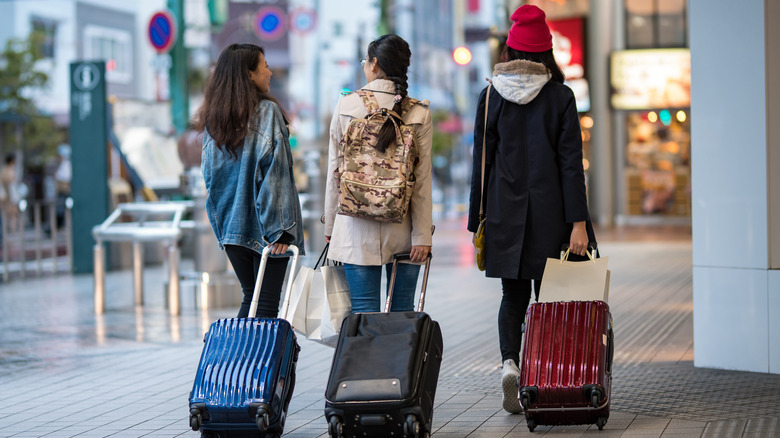The Common Item You Probably Shouldn't Pack For Your Trip To Japan
A trip to Japan requires some careful packing. Daily staples used in your country can be a no-no in the East Asian destination, and some common medicines in the U.S. could even get you arrested if packed in your Japan-bound luggage. The law isn't the only code you'll need to abide by when preparing for your trip. Japan is a country that runs on social norms and unspoken rules, and while stepping outside those boundaries might not get you thrown in jail, you could face some unwelcome stares from the locals. That's why something as seemingly innocuous as perfume should be left at home during your Japanese getaway.
According to a 2021 Statista survey, only 16% of people in Japan regularly wear perfume and other fragrances. Compare that to countries like Turkey, where 85% of respondents don't leave the house without a spritz, or the U.S., where a sizable 41% regularly wear scents. Moreover, research from Euromonitor International reveals that while Japanese consumers are known to shell out money for beauty products, Japan makes up the smallest fragrance market in the world (via BeautyMatter). Freshening up with perfume or cologne during your vacation might not get you in serious trouble, but it will make you stand out — and not in a good way.
Why is perfume so uncommon in Japan?
If you're from a heavily fragranced culture, Japan's attitudes toward perfume might seem like nothing more than a cultural quirk. However, the reality is a bit more complicated. Japanese society has long been aware of how scents can irritate others, and the concept of "kougai" — or "scent pollution" — has gained momentum in recent years. Nippon.com reports that complaints about synthetic fragrances have been on the rise for years, and between 2014 and 2020, Japan's National Consumer Affairs Center received 928 reports of health issues associated with scented fabric softeners.
In response to the growing awareness of scent pollution, the government rolled out educational posters in 2021 to remind people to limit their use of scented products. The reminders are especially important in big cities such as Tokyo, where people are often densely packed into trains, buildings, and attractions. In these environments, one spritz of a strong perfume could reach hundreds of noses in just seconds — and there's a good chance at least a few might find the smell off-putting. Even if your go-to scent receives compliments back home, it's a good idea to skip it when traveling around Japan.
How to smell fresh without strong fragrances
The no-perfume norm in Japan is a double-edged sword: You won't be accused of causing scent pollution when you nix strong fragrances from your routine, but you might be accused of "sumehara," or smell harassment, if you reek of B.O., instead. Sweat and other unpleasant odors are especially hard to manage during the Japanese summertime when temperatures routinely reach over 100 degrees Fahrenheit.
To keep foul smells to a minimum, consider taking some tips from the people who live in Japan. First, make sure to bring your favorite deodorant or antiperspirant from home, as these products aren't readily available in all Japanese drugstores. (A 2010 study published in the Journal of Investigative Dermatology confirmed that many Asians lack the gene responsible for smelly underarms, which might partially explain the shortage of deodorant products.) Then, if you catch a whiff of your own B.O. while in line at Tokyo Disneyland or as you're biking around Kyoto, grab a disposable body wipe (found in packs in drugstores and superstores, such as Don Quijote) to eliminate sweat.
If you feel naked without a little extra fragrance, stick to scents that are light and barely detectable by those around you. Go for a body mist rather than a pungent perfume, or try a lotion containing essential oils instead. Even a hand soap with a lingering scent might be enough if you'll be spending time in crowded areas.


